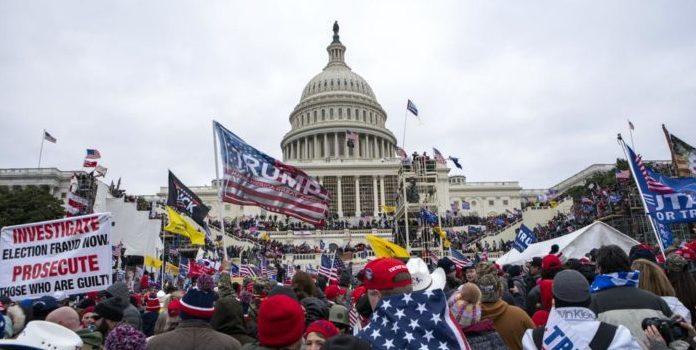(Ken Silva, Headline USA) Capitol Hill rioter Samuel Lazar pepper-sprayed police and urged protestors to “take their guns” during the Jan. 6, 2021, event.
Despite his violent actions, Lazar received a much lighter punishment than numerous other Jan. 6 defendants—receiving a 30-month sentence that he has fully served by now.
Documents briefly unsealed on Wednesday reportedly shed light on why the Justice Department gave him such a sweetheart deal.
Those documents reportedly revealed that Lazar snitched on untold other protestors. They also revealed that Lazar “was ready to testify” in a murder trial unrelated to Jan. 6, and that he was even a jailhouse snitch, according to NBC News reporter Ryan Reilly.
“As part of his cooperation, prosecutors wrote in their sentencing memo, Lazar ‘debriefed with the Government multiple times,’ was ready to testify in a murder case unrelated to Jan. 6, ‘offered information regarding security breaches at a federal detention facility’ and ‘gave the government valuable information with respect to other January 6 defendants,'” Reilly wrote Wednesday.
The documents were briefly unsealed Wednesday, but then removed from the court docket after the DOJ and Lazar’s attorneys told the court that they proposed redactions to those records. The attorneys asked the court to post redacted versions of the documents, but the court didn’t do so before the publication of this article.
NBC reporter Reilly reported on some of the contents of the briefly unsealed documents, but he did not release them in full. Reilly has been widely criticized as a stenographer for the FBI and DOJ, and so he’s unlikely to publish documents that the DOJ doesn’t want disclosed.
Lazar’s plea deal has been the subject of intrigue due to its secrecy.
The secret hearing prompted a coalition of media outlets to file a motion to have Lazar’s records unsealed.
The case raised concerns about transparency in the massive Jan. 6 investigation — the largest in DOJ history. Court hearings and records — including sentencing hearings and plea agreements — are supposed to be open and available to the public and the press unless there’s a compelling need for secrecy.
Lazar was transferred in July from FCI Fort Dix — a federal lockup in New Jersey — to “community confinement” overseen by the Bureau of Prisons, which means he was either in home confinement or a halfway house, according to a prisons system spokesperson.
A social media post from Lazar’s sister that month shows Lazar standing outside waving an American flag with the caption: “Hallelujah Praise God free at last … #walkingfree.”
Secret plea hearings are not unheard of, though the records are often unsealed ahead of sentencing.
Ken Silva is a staff writer at Headline USA. Follow him at twitter.com/jd_cashless.

